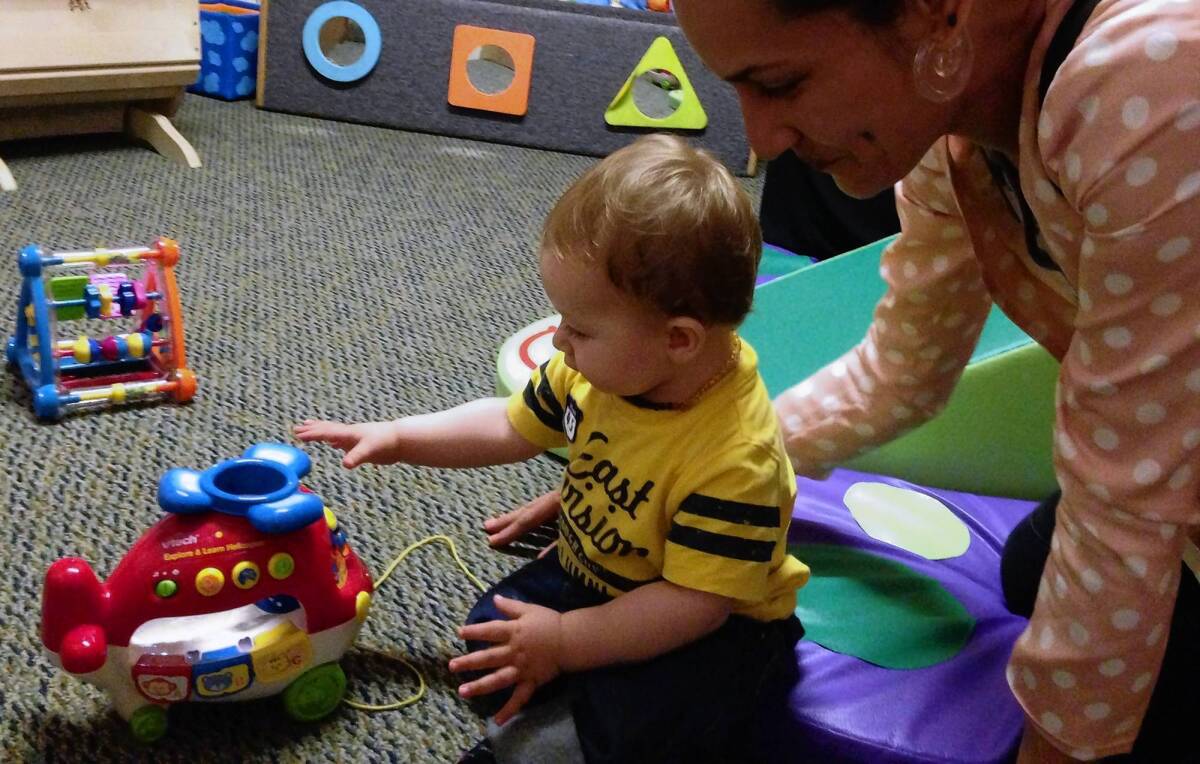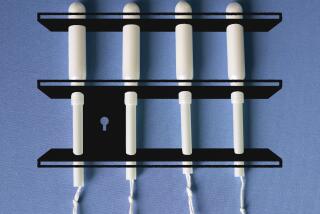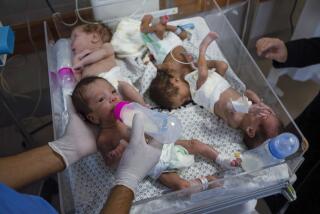Diaper crisis among poor families endangers children, study finds

There have been days, since her son Ezekiel was born 11 months ago, that Los Angeles mom Beth Capper has gone without food to keep up her supply. One friend was arrested for stealing some.
It’s not drugs or alcohol or even baby formula that has put her in such a bind. It’s diapers.
“There’s no way around buying them,” said Capper, a 41-year-old single mother who doesn’t work because of a disability.
Across the country, mothers like Capper are facing the same predicament. According to a report published Monday in the journal Pediatrics, diaper need — the inability to afford to keep a child in clean diapers — affects a “substantial” number of low-income Americans, with nearly 30% of mothers questioned in New Haven, Conn., reporting that they did not have enough for their children.
It’s a problem that often goes unnoticed.
“I call it the silent epidemic,” said Caroline Kunitz, who runs Pacific Palisades-based L.A. Diaper Drive, which will distribute 1.5 million diapers to nonprofit partners around Southern California this year.
In Los Angeles, nonprofits and social service agencies report that the need for diapers is “practically infinite” and that diapers “fly” out of warehouses as soon as they’re delivered. When word spread — mistakenly — that Los Angeles-based Baby2Baby was handing out diapers directly to parents, desperate parents came to its office and formed a line that snaked around the corner in just a couple of hours, said co-chair Norah Weinstein. The nonprofit also received 3,000 voice-mail messages that day.
Parents in need can get subsidized healthcare through Medicaid, subsidized rent through a public housing agency and subsidized food through the Special Supplemental Nutrition Program for Women, Infants and Children. But there are few places to turn when they need help paying for diapers.
Keeping a young child dry and clean can cost a pretty penny; the average is $18 a week. A single mother earning $15,080 a year in a minimum-wage job would need to devote more than 6% of her pay to diapers, according to the Pediatrics study.
Add in the fact that many lower-income families can’t afford to buy diapers in bulk at stores like Costco and Target and the expense becomes prohibitive. Cloth diapers are often not an option because they require frequent and expensive trips to the laundromat.
The report in Pediatrics is the first academic study to quantify diaper need, said coauthors Megan Smith of the Yale School of Medicine and Joanne Goldblum of the National Diaper Bank Network, both in New Haven.
Fanning out across New Haven to schools, stores, bus stops, beauty parlors and other locations where mothers might congregate, the research team asked women about their health, medical care, use of social services and access to basic needs such as food, housing and diapers.
They found that 27.5% of the women in the study reported diaper need. They didn’t have enough to change their children as often as they’d like, and they had turned to social service agencies, friends or family for help or had “stretched” the diapers they had. Latinas had a higher level of need than African American and white women. Women 45 or older (who the team assumed were mostly caring for grandchildren) also had greater need.
Women who said they had a lot of difficulty managing stress, sadness or trauma were nearly twice as likely as others to report diaper need, said Smith, a psychologist whose work focuses on maternal mental health.
“The inability to provide a diaper increases the stress levels of mothers incredibly,” she said. “An irritable baby is hard to soothe, and this can affect bonding” and a mother’s ability to cope with postpartum depression, she added.
There are other ramifications for families. Nearly 8% of the women in the study reported that they stretched diapers when supplies ran short.
Goldblum, a former social worker, said that she had often seen families resort to the practice: removing a dirty diaper, tossing out the solid waste and then returning the diaper to their baby’s bottom. Wearing a diaper for too long can cause health problems, including skin rashes and urinary tract infections.
Diaper need also affects families’ economic well-being, Smith and Goldblum said. Most child-care providers require parents to supply diapers. When families can’t, children miss days in day care and parents miss days at work or school.
In 2011, Rep. Rosa DeLauro (D–Conn.) introduced a bill in Congress that would have made it easier for child-care providers to use federal funds to supply diapers to needy families. In a letter to colleagues on Capitol Hill, DeLauro cited research that found that more than 1 in 5 mothers have had to stay home with their child because they didn’t have diapers to send to day care.
“Losing out on day care makes it even harder for parents to put in a full day’s work,” she wrote. “And so they fall further behind.”
DeLauro’s effort failed, in part because of opposition from critics such as Rush Limbaugh, who told his radio audience that “this gives a new meaning to the term ‘pampering the poor.’”
For now, much of the need will be met by nonprofits like the National Diaper Bank Network, which counts Baby2Baby and L.A. Diaper Drive among its members. (Early Head Start centers provide diapers to participating families on the grounds that they’re “necessary materials for sanitary and hygienic toileting practices,” according to the federal program’s website.)
Capper gets her diapers through Children’s Institute Inc., a Los Angeles-based children’s welfare organization that receives diapers from Baby2Baby and L.A. Diaper Drive.
Because Ezekiel is enrolled in the institute’s Early Head Start program, she gets free diapers. But many of the 25,000 children and families served by the organization receive diapers as a reward for attending parenting classes, said Megan Aubrey, the institute’s director of development.
Diapers have been the one incentive that keeps parents showing up for class, said Aubrey, who added that providing access to diapers “instills confidence” in struggling parents.
“No one wants to have their child in a soiled diaper all day long,” she said. “It’s a basic thing, but it’s really empowering.”
Until parents graduate out of the program, anyway. Then, for the most part, they’re back on their own.







